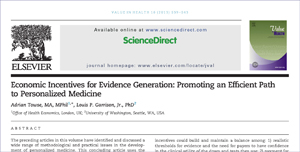Sign up to our newsletter Subscribe
An Analysis of NICE’s Optimised Decisions from 2015 to 2024

Sign up to our newsletter Subscribe


Four types of economic incentives for drugs and diagnostics are essential to encouraging more rapid progress in personalised medicine. Adrian Towse, OHE’s Director, and Lou Garrison, a professor at the University of Washington, summarise the critical economic issues in the…

Four types of economic incentives for drugs and diagnostics are essential to encouraging more rapid progress in personalised medicine.
Adrian Towse, OHE’s Director, and Lou Garrison, a professor at the University of Washington, summarise the critical economic issues in the development of evidence of value for drugs and diagnostics that are part of personalised medicine.
Adrian Towse, OHE’s Director, and Lou Garrison, a professor at the University of Washington, summarise the critical economic issues in the development of evidence of value for drugs and diagnostics that are part of personalised medicine.[1] Their article draws on the methodological and practical insights of the other contributions in a special supplement of Value in Health that addresses the role of health economics and outcomes research in personalised medicine.
Towse and Garrison note that progress in personalised medicine has been slower than many had hoped, but that clear progress is being made despite continuing scientific challenges. Encouraging more rapid progress in the development and availability of drugs and diagnostics that are essential to personalised medicine requires appropriate sets of economic incentives. Towse and Garrison identify four that they believe are essential to creating the evidence needed to value and most efficiently use drugs and diagnostics. These are:
Tackling the scientific challenges requires, according to the authors, adjustments in the current pricing, evidence and intellectual property approaches. Essential is “building and maintaining a balance” across three sets of factors:
Creating a positive economic environment, then, is an important component of fostering continuous advances in the science.
Towse, A. and Garrison, L.P. (2013) Economic incentives for evidence generation: Promoting an efficient path to personalized medicine. Value in Health. 16(6 Suppl), S39-S43. doi: 10.1016/j.jval.2013.06.003.
Other recent OHE activities on the topic of personalised, stratified or precision medicines include:
An error has occurred, please try again later.

